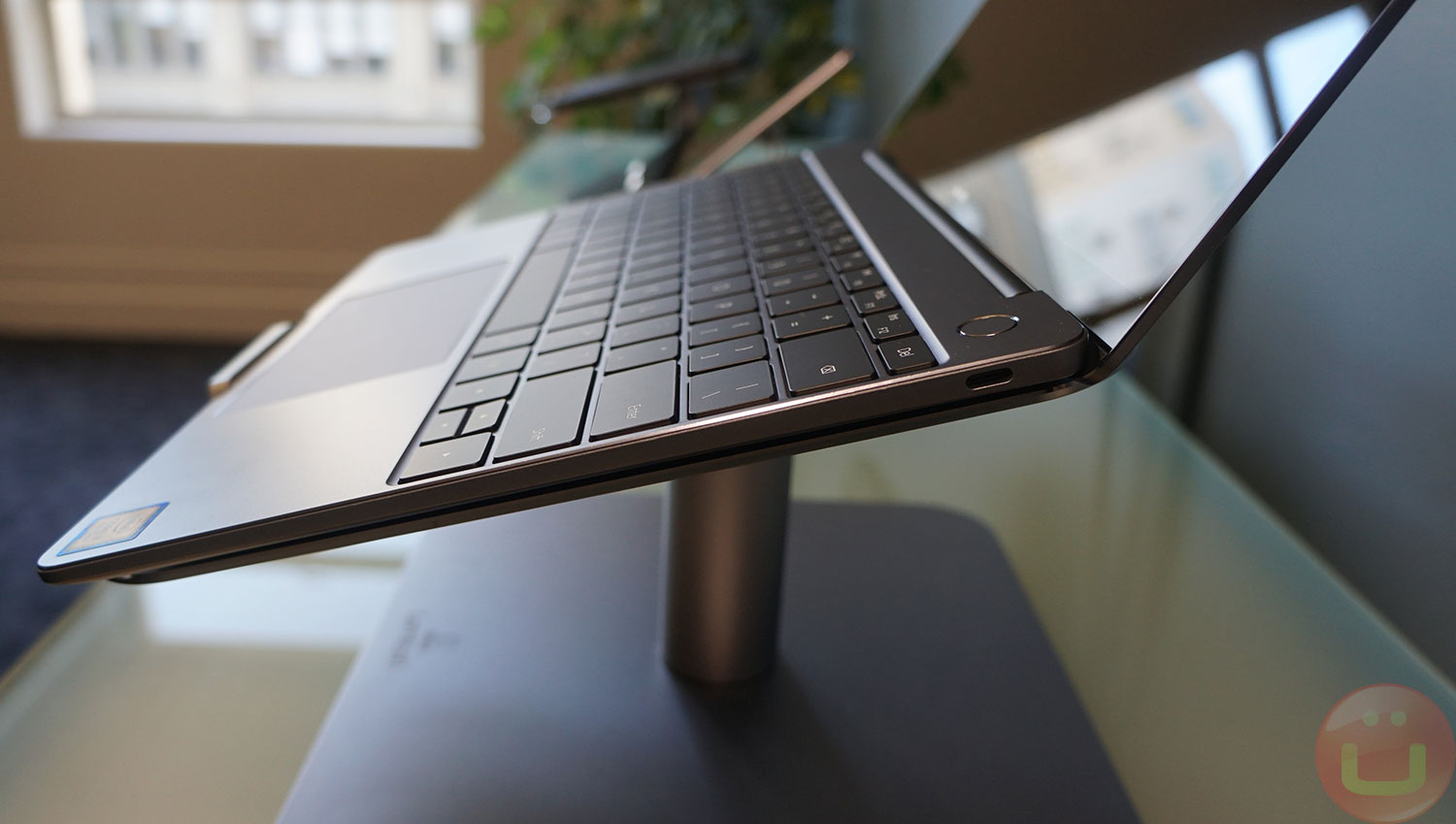Huawei Matebook 13 Premium Laptop

To do that, Huawei has kept the successful design language it created last year. However, when you look closely, some of the more expensive manufacturing processes such as diamond cuts, and other subtle (but important) details were left out of the Matebook 13.
Yet, the new Matebook 13 is slightly lighter (2.75 Lbs vs. 2.93 Lbs), so that’s one benefit that everybody will appreciate. The thickness is comparable (14.9 vs. 14.6mm) and so is the overall feel when manipulating this full-metal CNC aluminum design.

When you open the laptop, you can appreciate the 2K display with a 3:2 aspect ratio and a 100% sRGB color gamut reproduction. This is very good in this category, and only a few expensive laptops will have a vastly better display.
With 4.4mm bezels, Huawei claims an 88% display-to-body ratio. There are a couple of ways to compute this, but just looking at it, it’s obvious that the bezels are exceptionally thin, especially for a $999+ laptop. The cherry on the cake: the webcam is now placed at the top of the screen as users typically frown upon the bottom webcam.
The backlit keyboard has full-size keys with a 1.2mm travel, which is just about the average for laptop that size. The deepest key-travel for 13-14” laptops is 1.8mm and that usually has an impact on how thin the chassis can be. Huawei has made the keyboard spill-proof, which will protect it from one of the most common ways to damage a laptop.
Accordingly, the trackpad is very large and comfortable. We’re not sure if the surface is Glass or Mylar (a super-smooth plastic), but it felt nice, and you should be able to use it for hours without being bothered at the fingertips.
Other design considerations are the Power Button which is also the fingerprint reader (with encrypted security island), placed near the upper-left side of the keyboard. There are two bottom-firing speakers, which should not sound as great as the Matebook X Pro but we’ll try them side by side if we can.
There is one USB-C port on either side. It’s not a lot, but it’s often sufficient. However, Huawei realizes that USB-A devices are everywhere, so there’s a USB-C HUB/Dock included in the box – nice touch! Last, but not least, the Huawei 65W charger is very small and looks like a smartphone charger (it does charge phones too….). I wish that every laptop OEM would copy this!
The internal specs are relatively common for this price point but Huawei points out that it has an improved thermal solution, thanks to a new fan design. That explains why they can pack an NVIDIA MX150 (fast 25W version, not the 15W one), and you basically have two options:
- Core i5, 8GB/256GB/Intel-GPU version is $999
- Core i7-8565U with NVIDIA MX150 (25W) $1299
Huawei says that the system can boot in about 10 seconds, but this will change as soon as you install apps. Maybe that would be a good reference point to see how little bloatware there is. In any case, this laptop is poised to score high in Ubergizmo’s unique Performance/Price data point. We’re looking forward to putting it to the test. It should ship “in January” according to Huawei.
You May Also Like
Popular Right Now
- WhatsApp Introduces Voice Chats For All Groups, Inspired By Telegram
- Volonaut Airbike: Lightweight Flying Superbikes With Jet Propulsion Unveiled
- Flappy Bird Is Back! After 10 Years, It Brings A New Game Experience
- Google Messages Rolls Out On-Device Nudity Detection With Sensitive Content Warnings
- Google AI Mode Adds Multimodal Search To Mobile App
- Leaked Apple Watch Series 10 Prototype Reveals Unique Health Sensor And Potential Future Features
- Canon Unveils PowerShot V1 And EOS R50 V: Best New Vlogging Cameras For 2025
- Bill Gates Predicts: AI Will Replace Doctors And Tutors Within A Decade
- First Shutdown of Niagara Falls in 12,000 Years: A Rare Sight to Behold
- Former Google Engineer claims that humans will achieve immortality soon
- Romotow: The Foldable Camping Trailer Inspired By A USB Flash Drive
- LYRA: Swiss Startup Unveils AR Smart Glasses for Office Work, City Life, And Traveling
- Man Caught in China Smuggling $46K Worth of Intel CPUs Wrapped Around His Waist
- iPhone 15 Pro Max may bring thinner bezels than Xiaomi and Samsung’s latest flagships
- OpenAI's new GPT-4 with a "human-level performance" scored up to 93% on SAT exams
- iPhone SE 4 could be Apple's secret weapon to 'steal' budget customers from Samsung